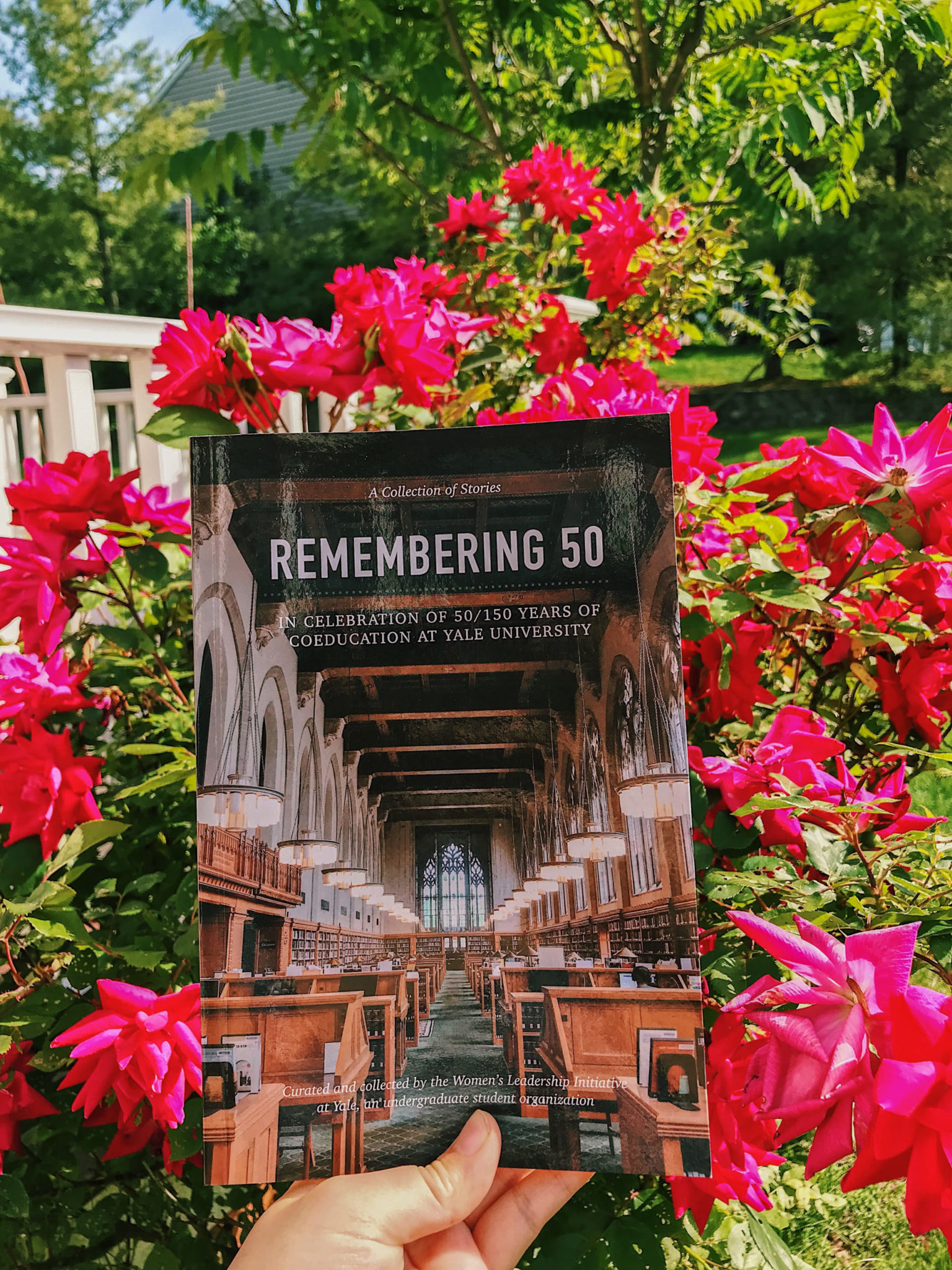
Courtesy of Jen Huang
In commemoration of the 50-year anniversary of women first enrolling at Yale College, the Women’s Leadership Initiative released a book called “Remembering 50” earlier this month.
The book features stories and recollections from alumni discussing their experiences of coeducation at Yale from graduation classes ranging 1971 to 2020. Stories of 34 Yale College alumni — including four who were enrolled in 1969, the first year women were admitted to the College — were included. The stories cover historical events on campus, such as the Women’s Crew Title IX protest and the 20th anniversary of coeducation at Yale College. The initiative for “Remembering 50” was spearheaded by Ananya Kachru ’22 and Jen Huang ’22, both members of the WLI Board.
“What the purpose of the book is, is to basically provide a platform for women and men and people of all gender identities to talk about what their experience was like at Yale, specifically as it relates to coeducation,” Huang said. “It’s just a really interesting way to see how coeducation has evolved throughout the years and what the attitude is surrounding women on campus, as it relates to the passage of time and changing of culture.”
The idea for the book came when Huang and Kachru discussed WLI and 50 Fest — Yale’s celebration of 50 years of coeducation held on Old Campus last September. Kachru told the News that 50 Fest fell somewhat flat.
“I remember attending 50 Fest on Old Campus last fall, which was filled with yummy food and some dancing, and really wishing there was an opportunity to get to know the incredible women from the first classes in a more meaningful way,” she wrote to the News. “The women who visited during 50 Fest are such trailblazers and I wanted to know more about their stories.”
Huang added that she thought Yale should do more to commemorate women during its official celebration. They wanted to find a way to recognize the milestone more “appropriately and with more impact.”
Huang and Kachru quickly implemented their idea and solicited stories for the book. According to Huang, they aimed to get an “intertemporal perspective” by contacting different alumni groups and mailing lists.
Two people who shared their stories with WLI told the News that they had mixed experiences during their time at Yale.
Elissa Greenwald ’76 GRD ’81 discussed her experience as one of the first members of Proof of the Pudding — Yale’s second oldest female a cappella group — and its founding during her time at Yale.
“I wanted to write to show the example of female leadership and solidarity, because I was so impressed by the two women who put it together,” Greenwald said. “I thought it was interesting to reflect on how it started out and how important it was for me to have an all women’s group when women were in such minority.”
Greenwald noted that, during her time at Yale, the ratio of men to women was four to one, making Proof of the Pudding the only group she was involved in at the College that was composed solely of women. She described the experience as “very, very powerful,” and said her piece in the book emphasized the empowerment gained at Yale, which has stayed with her throughout life.
Still, she recognized that while Yale empowered women, it also marginalized them to an extent.
“I’ve read through the book and unfortunately some of that marginalization is still true from what I read from recent graduates,” Greenwald said.
Lynn Baker ’78 LAW ’85 recalled her time as a member of the Women’s Crew team during the team’s Title IX protest. Baker stated that she did not participate in the protest — not because she “was opposed as a matter of principle at all” — but rather because she had concerns related to her financial position in comparison to her teammates’.
“I felt extremely fortunate to have the chance to go to Yale,” Baker said. “Not just for the reasons everyone does, but Yale had given me enough financial aid of all sorts that I could do it financially. When you’re in that position, you’re feeling very vulnerable.”
She added that, at the time, she was “terrified that something bad was going to happen and we were all going to get thrown out.”
Baker decided to speak with her dean regarding her feelings surrounding the protest. She recalled being “stunned” to learn that the structure was such that her teammates would not be disciplined, but rather that the protest would leave the Yale administration more accountable. She stated that this experience helped her appreciate that “even within Yale, people who seemingly have little power can have a great deal of power.”
Both Baker and Greenwald spoke about their pieces, along with 15 other contributors, during WLI’s Remembering 50 book launch event on Sept. 10.
When asked about what readers should take away from the book, empowerment and female solidarity were recurring themes.
“To understand the obstacles they faced when they were first coming here and understand how they were gradually overcome can also be applied to the issues Yale is facing today,” Huang said. “It demonstrates how certain things don’t really change, like the importance of strong women friendships and really great support systems. I think those are very consistent themes throughout.”
The Yale Women’s Leadership Initiative was founded in 2006.
Maya Geradi | maya.geradi@yale.edu
Correction, Sept. 22: A previous version of the article implied Proof of the Pudding was the only all-female group at Yale at the time — a statement that was mistakenly changed during the editing process. The New Blue of Yale, Yale’s oldest female a cappella group, also existed at the time. The article has been clarified to state that Proof of the Pudding was the only all-female group that Greenwald was involved in at Yale.







